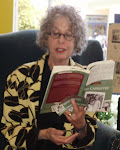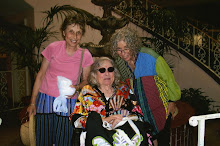Some say women are "invisible" after forty. The only time it really bothers me is when I'm trying to get a salesperson to acknowledge me so I can complete my transaction and be on my way. Of course, it would be nice to have someone flirt with me occasionally, but even that's no great loss; I've got a good husband who sees past the wrinkles.
So what's so bad about being invisible? Not everyone can do it. I know it wouldn't work for my husband. He's the "peacock" and being the center of attention suits him, and it suits me, too, because it allows me to observe. To observe is one of the benefits of "invisibility." If you've spent time in a big city, you know what I mean. In an urban setting, nearly everyone thinks they're invisible.
My husband collects antiques. I collect "moments," little bits of sensory nuggets. Here's the last little bit garnered from a recent trip to the city. A young woman, walking while talking on her cell phone somewhere around 33rd and Broadway, said to her friend, "I told him to bring me something vegan. And you know what he brought me? A stuffed animal."
I could not have made that up. What a rich little nugget! Now, don't you agree there's something to be said for being "invisible?"
Barbara
What they're saying about our new book:
"The elderly have quite a bit of wisdom, and often you'll get it whether you want it or not. "Feeding Mrs. Moskowitz & The Caregiver" is a pair of two novellas focusing on the topic of the elderly and their interactions with the people around them. 'Feeding Mrs. Moskowitz' is the story of the titular elderly lady and her encounters with a girl rapidly approaching middle age. 'The Caregiver' tells the tale of a caregiver and her job at an assisted living facility. "Feeding Mrs. Moskowitz & The Caregiver" is an enticing read that shouldn't be missed."
-- Midwest Review of Books
"The novellas are authentic, filled with believable characters and situations that resonate with our own life experiences. The stories are funny and poignant at the same time, teaching those who have not thought much about the aging process in the best way possible by fascinating and amazing us."
-- Anne M. Wyatt-Brown
"As someone who was the caregiver for two aging parents, both of whom lived into their nineties, I found Feeding Mrs. Moskowitz and The Caregiver: Two Stories by Barbara Pokras and Fran Yariv a delightful experience. It is a candid and humorous look at aging. .....It is well work reading whether one is a caregiver or not. This is a slice of life worth visiting."
-- Alan Caruba, Bookviews
"Caring for aging parents is one of the most common experiences sisters share, but few can transform their responsibility into bittersweet words of wisdom the way the Pokras sisters, Fran and Barbara, have done. This book, with its tender, funny, and revealing insights into the world of the elderly, is a must-read for every caretaker." -- Carol Saline, author of The New York Times bestseller, "Sisters"
"The novellas are beautiful little parables that are just not meant for caregivers or for the children of the elderly, bur for everyone -- as most of us will, eventually, take similar journeys to those taken by the residents of Sunset Hills, in one form or another." -- John McDonald, New York Journal of Books, award-winning novelist, screenwriter, playwright and graphic novel adaptor of the works of William Shakespeare.
-- Midwest Review of Books
"The novellas are authentic, filled with believable characters and situations that resonate with our own life experiences. The stories are funny and poignant at the same time, teaching those who have not thought much about the aging process in the best way possible by fascinating and amazing us."
-- Anne M. Wyatt-Brown
"As someone who was the caregiver for two aging parents, both of whom lived into their nineties, I found Feeding Mrs. Moskowitz and The Caregiver: Two Stories by Barbara Pokras and Fran Yariv a delightful experience. It is a candid and humorous look at aging. .....It is well work reading whether one is a caregiver or not. This is a slice of life worth visiting."
-- Alan Caruba, Bookviews
"Caring for aging parents is one of the most common experiences sisters share, but few can transform their responsibility into bittersweet words of wisdom the way the Pokras sisters, Fran and Barbara, have done. This book, with its tender, funny, and revealing insights into the world of the elderly, is a must-read for every caretaker." -- Carol Saline, author of The New York Times bestseller, "Sisters"
"The novellas are beautiful little parables that are just not meant for caregivers or for the children of the elderly, bur for everyone -- as most of us will, eventually, take similar journeys to those taken by the residents of Sunset Hills, in one form or another." -- John McDonald, New York Journal of Books, award-winning novelist, screenwriter, playwright and graphic novel adaptor of the works of William Shakespeare.
Friday, April 30, 2010
Monday, April 26, 2010
The other day I read about a woman undergoing treatment for breast cancer. In the article she expressed her gratitude for the online sites, such as Caring Bridge, which allow people with serious illnesses to easily keep friends, family and acquaintances up to date on their treatment. I won't presume to pass judgement. Having undergone treatment four times for cancer, I know everyone deals with these traumas in his or her own way. What the story did was to remind me how drastically our culture has changed. We've gone from "don't talk about it" to Twitter.
When I was growing up, people kept personal issues private. Everything, it seemed, was a secret. Marital problems and illness were among the real no-nos. "Nervous breakdown" was the general term used when someone disappeared for a while. It implied everything from anxiety to full-fledged insanity. Cancer was a word to be avoided, or whispered. When I was first diagnosed with breast cancer thirty years ago, my mother-in-law wrote a lovely letter, concluding with "don't worry. I won't tell anyone" even though I did not swear her to secrecy.
Today, of course, people believe their every feeling, experience and activity is worthy of being shared with the world at large. It's my guess that the openness of the 60's and the Internet are responsible. So, I ask myself, which do I prefer? Offhand, the elimination of the "society of secrecy" is a positive. People who are in failing relationships, or are diagnosed with serious illnesses should not be made to feel shame or guilt. I am grateful when good friends confide problems and experiences, but at the same time, I find it annoying to be the recipient of constant less than earth-shattering news from acquaintances. Sort of like the lengthy Christmas letters sent en masse describing every trip, family gathering, and on and on.
The question I ask myself, is have we as a society become so self-involved that we take for granted the world is interested in our everyday comings and goings? If so, is it a generational thing? Just wondering.
Fran
When I was growing up, people kept personal issues private. Everything, it seemed, was a secret. Marital problems and illness were among the real no-nos. "Nervous breakdown" was the general term used when someone disappeared for a while. It implied everything from anxiety to full-fledged insanity. Cancer was a word to be avoided, or whispered. When I was first diagnosed with breast cancer thirty years ago, my mother-in-law wrote a lovely letter, concluding with "don't worry. I won't tell anyone" even though I did not swear her to secrecy.
Today, of course, people believe their every feeling, experience and activity is worthy of being shared with the world at large. It's my guess that the openness of the 60's and the Internet are responsible. So, I ask myself, which do I prefer? Offhand, the elimination of the "society of secrecy" is a positive. People who are in failing relationships, or are diagnosed with serious illnesses should not be made to feel shame or guilt. I am grateful when good friends confide problems and experiences, but at the same time, I find it annoying to be the recipient of constant less than earth-shattering news from acquaintances. Sort of like the lengthy Christmas letters sent en masse describing every trip, family gathering, and on and on.
The question I ask myself, is have we as a society become so self-involved that we take for granted the world is interested in our everyday comings and goings? If so, is it a generational thing? Just wondering.
Fran
Subscribe to:
Comments (Atom)
My Blog List
Some of our favorites to share:
- Barbara's favorite movies: "Precious" "Inglorius Bastards" "The Orange Thief" (never released theatrically), anything by Frederick Wiseman, and "Stop Making Sense" (I worked on this!)
- Fran likes "ALL ABOUT EVE" with Bette Davis
- Another of Fran's favorites -- FIELDWORK by Mischa Berlinski







